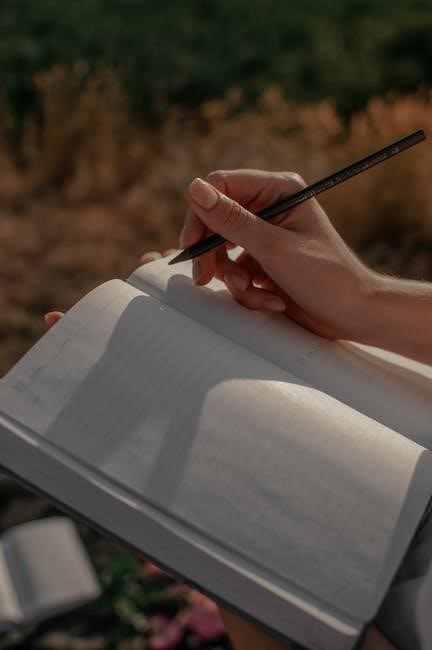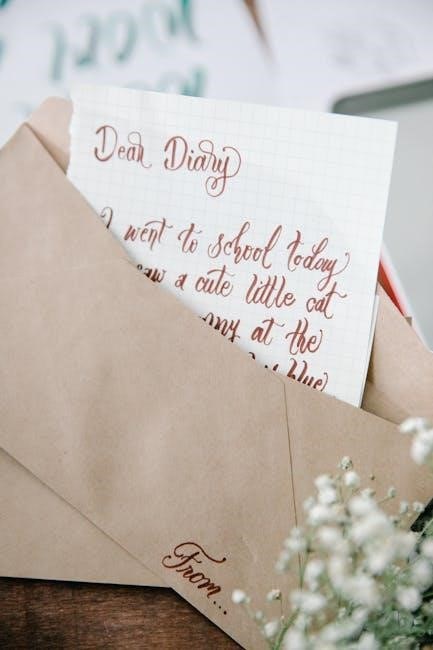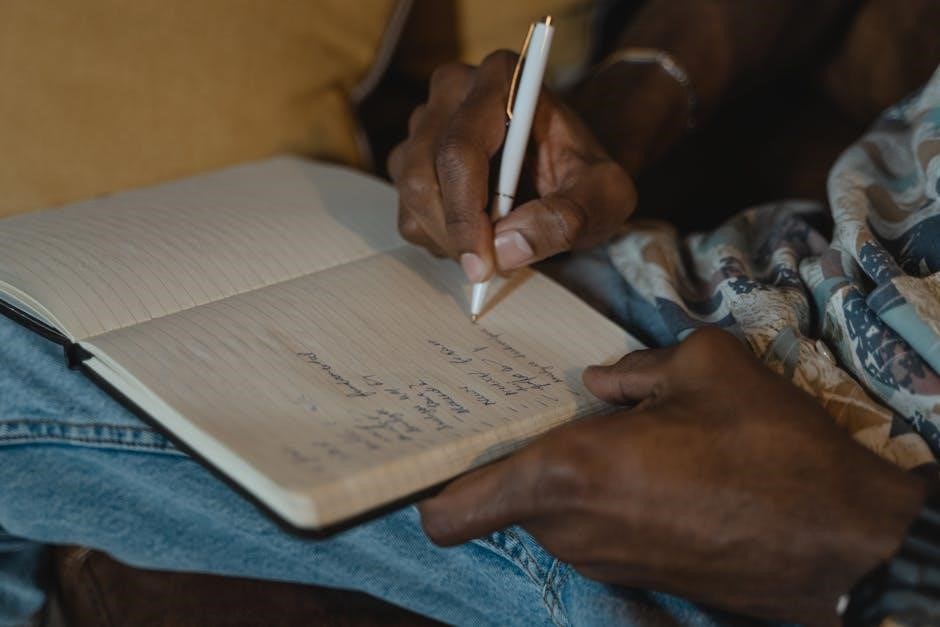Bridget Jones’s Diary Script PDF: A Comprehensive Overview
Bridget Jones’s Diary has captured hearts worldwide. The screenplay, available in PDF, offers deeper insights into Bridget’s journey. Dive into the humor and relatable struggles of a single woman navigating life, love, and self-discovery.
Availability of the Script in PDF Format
The Bridget Jones’s Diary script in PDF format is widely accessible for fans and film students. Several online platforms host the screenplay, offering a detailed look into the movie’s construction.
Websites dedicated to screenplays and movie scripts often feature the Bridget Jones’s Diary script for download. These sources allow enthusiasts to study the dialogue, scene descriptions, and character interactions as originally conceived by the writers.
Academic databases and online libraries may also provide access to the script, especially for those researching romantic comedies or adaptations of novels to film. These resources often require subscriptions or institutional access, but they offer reliable and authoritative versions of the screenplay.
Fan-created websites and forums dedicated to the movie may also host unofficial versions of the script. However, it’s essential to verify the accuracy and completeness of these sources, as they may contain errors or be incomplete versions. Always check several sources.
The availability of the Bridget Jones’s Diary script in PDF format provides valuable insights for aspiring screenwriters, film students, and fans.
Characters and Their Roles in the Script
The Bridget Jones’s Diary script showcases a cast of memorable characters, each playing a crucial role in Bridget’s journey. Bridget Jones herself is the central figure, a relatable and flawed protagonist navigating the challenges of single life in London.
Mark Darcy, based on Jane Austen’s Pride and Prejudice, serves as Bridget’s initial antagonist and eventual love interest. His character arc involves overcoming his initial snobbery and revealing his genuine affection for Bridget.
Daniel Cleaver, Bridget’s charming but unreliable boss, represents a tempting but ultimately unsuitable romantic option. His role is to create conflict and highlight Bridget’s poor judgment in relationships.

Bridget’s friends, including Shazzer, Jude, and Tom, provide comedic relief and offer support throughout her trials and tribulations. They represent the importance of friendship and solidarity in navigating life’s ups and downs.
Bridget’s parents, particularly her mother, contribute to the story’s humor and highlight the pressures Bridget faces to conform to societal expectations. Their well-intentioned meddling adds depth to Bridget’s character and her desire for independence.
Each character in the script is carefully crafted.
Key Themes and Resolutions
The Bridget Jones’s Diary script explores several key themes that resonate with audiences. Self-acceptance is central, as Bridget learns to embrace her imperfections and value herself for who she is, rather than striving for an unattainable ideal.
The script also delves into the complexities of modern relationships, portraying the challenges of finding love and navigating social expectations in a world of mixed signals and conflicting desires. Friendship plays a vital role, highlighting the importance of support networks in overcoming personal struggles.
Another theme is societal pressure on single women, particularly the expectations to find a partner and conform to traditional roles. Bridget’s journey involves resisting these pressures and defining her own path to happiness.
The resolutions in the script offer satisfying conclusions to these thematic explorations. Bridget ultimately finds love with Mark Darcy, not by changing herself, but by being accepted for who she is. She learns to prioritize her own happiness and build meaningful connections with friends and family.
The script reinforces the idea that happiness comes from within, rather than from external validation or societal approval. The resolutions provide a hopeful message about self-discovery and the power of embracing one’s true self.
Analysis of Dialogue and Humor
The Bridget Jones’s Diary script excels in its witty dialogue and relatable humor. The humor stems from Bridget’s candid inner monologue, which is often at odds with her outward actions, creating comedic situations.
The dialogue is characterized by its authenticity, capturing the way real people speak, with all their awkwardness and insecurities. The script uses self-deprecating humor to great effect, allowing audiences to laugh at Bridget’s flaws while also empathizing with her struggles.
The humor is also derived from the contrast between Bridget’s expectations and reality. Her attempts at self-improvement often backfire hilariously, highlighting the absurdity of modern life.
The dialogue between characters is sharp and engaging, revealing their personalities and relationships. The banter between Bridget and her friends is particularly entertaining, showcasing their loyalty and support for one another.
The script also employs situational humor, placing Bridget in awkward and embarrassing situations that resonate with audiences. The humor is never mean-spirited, but rather affectionate and understanding of human foibles. The clever use of irony and sarcasm adds another layer of comedic depth to the script.
Adaptation from Book to Screenplay
Adapting Helen Fielding’s novel, Bridget Jones’s Diary, into a screenplay required careful consideration of narrative structure and character development. The screenplay condenses the novel’s episodic diary entries into a cohesive cinematic narrative.
Key plot points and character arcs were preserved, while certain subplots and minor characters were streamlined for pacing. The screenplay emphasizes the central love triangle between Bridget, Daniel Cleaver, and Mark Darcy, creating dramatic tension and romantic intrigue.
The adaptation maintains the novel’s humorous tone and relatable themes, ensuring that the film resonates with fans of the book. The screenplay captures Bridget’s voice through witty dialogue and internal monologue, allowing audiences to connect with her insecurities and aspirations.
The adaptation cleverly translates Fielding’s satirical commentary on modern dating and societal expectations into visual gags and comedic set pieces. The screenplay also expands upon the novel’s supporting characters, giving them more depth and agency.
The adaptation successfully balances faithfulness to the source material with the demands of cinematic storytelling, resulting in a film that is both entertaining and emotionally resonant. The scriptwriters made judicious choices in selecting which elements of the book to emphasize, ensuring that the film captures the essence of Bridget Jones’s world.
Comparison of Different Script Versions
Examining various script versions of Bridget Jones’s Diary reveals the evolution of the story and characters. Early drafts might have contained scenes or dialogue that were later cut or revised for pacing, clarity, or comedic effect. Comparing these versions offers insight into the creative process and the decisions made by the writers and director.

Differences in character emphasis, plot development, and thematic exploration may exist across script versions. Some versions might have explored certain aspects of Bridget’s life in greater detail, while others focused more on the romantic relationships. Deleted scenes or alternate endings could provide a glimpse into different possible directions for the story.
Analyzing the changes made between script versions helps to understand the challenges of adapting a novel for the screen. The writers likely experimented with different ways to capture the essence of Bridget’s voice and the humor of the book. Comparing these versions reveals the collaborative nature of filmmaking and the iterative process of script development.

The final shooting script represents the culmination of these efforts, reflecting the choices made to create the most effective and engaging film. Examining earlier drafts offers valuable insights into the creative decisions that shaped the beloved rom-com.
Critical Reception of the Screenplay
The screenplay for Bridget Jones’s Diary garnered significant attention and praise from critics; Its witty dialogue, relatable characters, and humorous portrayal of modern relationships were widely appreciated. Critics lauded the script’s ability to capture the spirit of Helen Fielding’s novel while adapting it effectively for the screen.
The screenplay’s success lay in its ability to translate Bridget’s inner thoughts and diary entries into engaging cinematic moments. The voiceover narration, combined with physical comedy and sharp dialogue, created a unique and memorable viewing experience. Critics also praised the script’s clever use of romantic comedy tropes, subverting expectations while still delivering a satisfying love story.
Some critics noted the screenplay’s reliance on stereotypes and clichés, but these were often seen as part of the film’s self-aware humor. The script’s ability to balance comedic elements with genuine emotional moments was a key factor in its positive reception. The performances of the cast, particularly Renée Zellweger as Bridget, were also praised for their ability to bring the characters to life.
Overall, the screenplay for Bridget Jones’s Diary was considered a major success, contributing to the film’s box office success and enduring popularity. Its clever writing, relatable characters, and humorous portrayal of modern life resonated with audiences and critics alike.
Impact on Rom-Com Genre
Bridget Jones’s Diary had a significant impact on the romantic comedy genre. It revitalized the genre by introducing a flawed, relatable, and self-deprecating female protagonist. Unlike the traditionally perfect heroines of rom-coms, Bridget was portrayed as a woman struggling with weight, career, and relationships, making her instantly relatable to a wide audience.
The film’s success paved the way for more realistic and honest portrayals of women in romantic comedies. It challenged the unrealistic expectations often presented in the genre, focusing on Bridget’s personal growth and self-acceptance rather than solely on finding a romantic partner. This shift resonated with audiences who were tired of the same old tropes.

Bridget Jones’s Diary also influenced the use of humor in rom-coms. The film’s blend of witty dialogue, physical comedy, and self-deprecating humor set a new standard for the genre. It demonstrated that romantic comedies could be both funny and emotionally resonant, appealing to a broader audience.
The film’s success led to a wave of similar rom-coms featuring flawed and relatable female protagonists. It inspired filmmakers to explore more realistic and diverse storylines, moving away from the traditional fairytale narratives. Bridget Jones’s Diary left an indelible mark on the rom-com genre, shaping its evolution and inspiring a new generation of filmmakers.
Where to Find the Official Script PDF
Finding the official Bridget Jones’s Diary script PDF can be a quest for fans and aspiring screenwriters. While readily available on some sites, verifying authenticity is crucial. Start your search on reputable websites dedicated to screenplays, such as those affiliated with film schools or industry organizations. These often provide access to legitimate scripts for educational purposes.
Movie script databases or online archives are valuable resources. Look for sites that clearly indicate the source of their scripts and whether they are official releases. Check the website’s credibility by looking for reviews or recommendations from other users. Consider whether the website has copyright or legal disclaimers.
Another avenue is to explore the publisher’s website or the film studio’s official online store. Some studios offer digital copies of screenplays as part of their promotional materials or as educational resources. Additionally, academic databases might contain the script as part of scholarly articles or film studies resources.
Remember to exercise caution when downloading files from the internet. Ensure your device has adequate antivirus protection before downloading any PDF, and be wary of sites that ask for excessive personal information. Accessing the official script PDF ensures you’re studying the authentic version, providing a valuable resource for understanding the film’s creation.
